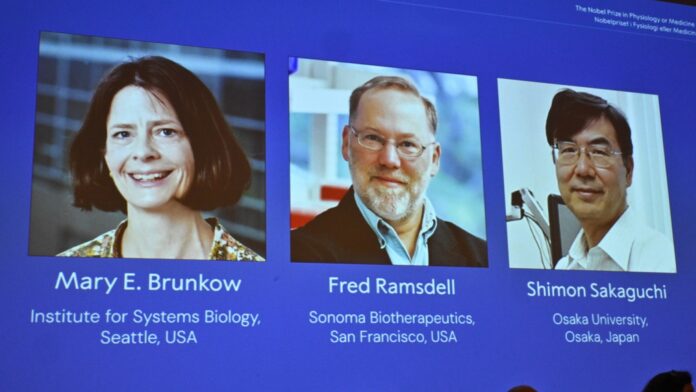"Trailblazers in Immunology: Mary E. Brunkow, Fred Ramsdell, and Shimon Sakaguchi Awarded Nobel Prize for Groundbreaking Discoveries"
Nobel Prize in Medicine Awarded for Breakthroughs in Immune Tolerance
STOCKHOLM — On Monday, the Nobel Assembly at the Karolinska Institutet honored Mary E. Brunkow, Fred Ramsdell, and Shimon Sakaguchi with the prestigious Nobel Prize in Medicine for their groundbreaking discoveries related to peripheral immune tolerance. This recognition highlights their significant contributions to understanding how the immune system regulates itself, a crucial area of research with implications for treating autoimmune diseases and cancer.
The Laureates
Mary E. Brunkow, 64, serves as a senior program manager at the Institute for Systems Biology in Seattle. Fred Ramsdell, also 64, is a scientific adviser for Sonoma Biotherapeutics in San Francisco. Shimon Sakaguchi, 74, holds the position of distinguished professor at the Immunology Frontier Research Center at Osaka University in Japan. Together, their work has reshaped the landscape of immunology.
Understanding Immune Tolerance
The immune system is a complex network designed to identify and eliminate pathogens such as bacteria and viruses. Central to this process are T cells, which are trained to recognize harmful entities. However, some T cells can mistakenly target the body’s own tissues, leading to autoimmune diseases. This is where the concept of central tolerance comes into play, a mechanism that eliminates potentially harmful T cells in the thymus.
The Nobel laureates expanded this understanding by uncovering an additional layer of immune regulation. Their research revealed how the body maintains immune balance through a specialized subset of T cells known as regulatory T cells (T-regs).
Key Discoveries
The journey began in 1995 when Sakaguchi identified the previously unknown T-regs. This discovery laid the groundwork for subsequent research. In 2001, Brunkow and Ramsdell identified a mutation in the Foxp3 gene, which plays a critical role in a rare autoimmune disease known as IPEX syndrome. Two years later, Sakaguchi linked these findings, demonstrating that the Foxp3 gene is essential for the development of T-regs, which act as a regulatory mechanism to prevent other T cells from overreacting.
The Nobel Committee emphasized that these discoveries have opened a new field of immunology, with researchers worldwide now exploring the potential of T-regs in developing therapies for autoimmune diseases and cancer. "Their discoveries have been decisive for our understanding of how the immune system functions and why we do not all develop serious autoimmune diseases," stated Olle Kämpe, chair of the Nobel Committee.
Reactions and Future Implications
Thomas Perlmann, Secretary-General of the Nobel Committee, shared that he reached Sakaguchi by phone shortly after the announcement. "He sounded incredibly grateful and expressed that it was a fantastic honor. He was quite taken by the news," Perlmann remarked. Efforts to contact Brunkow and Ramsdell were ongoing at the time of the announcement.
The 2025 Nobel Prize in Medicine is the first of this year’s Nobel announcements, with subsequent prizes for physics, chemistry, literature, and peace set to follow throughout the week. The award ceremony will take place on December 10, coinciding with the anniversary of Alfred Nobel’s death in 1896.
Conclusion
The work of Brunkow, Ramsdell, and Sakaguchi not only enhances our understanding of immune tolerance but also paves the way for innovative treatments for autoimmune diseases and cancer. As research continues to evolve in this field, the implications of their discoveries could lead to significant advancements in medical science, offering hope to millions affected by these conditions.
